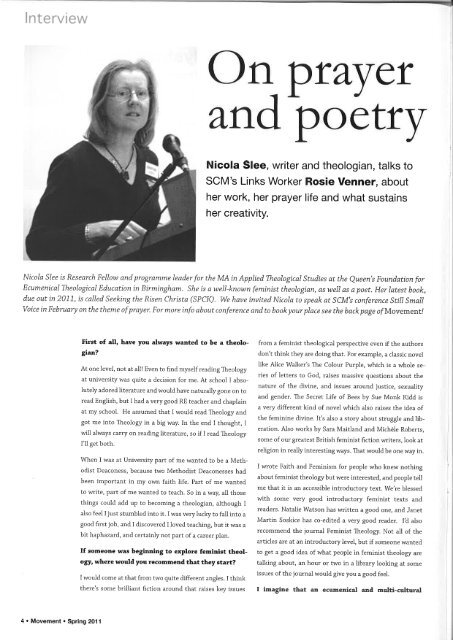Movement 137
You also want an ePaper? Increase the reach of your titles
YUMPU automatically turns print PDFs into web optimized ePapers that Google loves.
lnterview<br />
n ptaycf<br />
an ctfy<br />
\'<br />
,,.<br />
i<br />
"l<br />
:1,g<br />
.$<br />
Nicola Slee, writer and theologian, talks to<br />
SCM's Links Worker Rosie Venner, about<br />
her work, her prayer life and what sustains<br />
her creativity.<br />
Nicola Slee is Research Fellow and programme leader for the MAin Applied Theological Studies at the Queen's Found.ation for<br />
Ecumenical Theological Education in Birmingham. She is a well-known feminist theologian, as well as a poet. Her latest book,<br />
dueoutin20ll,iscalledSeekingtheRisenChrista(SPCR). WehaveinvitedNicolatospeakatSCM'sconferenceStillsmalt<br />
Voice in February on the theme of prayer. For more info about conference and to bookyour place see the backpage of <strong>Movement</strong>/<br />
First of all, have you always wanted to be a theologian?<br />
At one level, not at all! Even to find myself reading Theology<br />
at university was quite a decision for me. At school I absolutely<br />
adored literature and would have naturally gone on to<br />
read English, but I had a very good RE teacher and chaplain<br />
at my school. He assumed that I would read Theology and<br />
got me into Theology in a big way. In the end I thought, I<br />
will always carry ot reading literature, so if I read Theology<br />
I'll get both.<br />
When I was at University part of me wanted to be a Methodist<br />
Deaconess, because two Methodist Deaconesses had<br />
been important in my own faith life. Part of me wanted<br />
to write, part of me wanted to teach. So in a way, all those<br />
things could add up to becoming a theologian, although I<br />
also feel I just stumbled into it. I was very lucky to fall into a<br />
good first job, and I discovered I loved teaching, but it was a<br />
bit haphazard, and certainly not part of a career plan.<br />
If someone was beginning to explore feminist theologn<br />
where would you recommend that they start?<br />
I would come at that from two quite different angles. I think<br />
there's some brilliant fiction around that raises key issues<br />
from a feminist theological perspective even if the authors<br />
don't think they are doing that. For example, a classic novel<br />
like Alice Walker's The Colour Purple, which is a whole series<br />
of letters to God, raises massive questions about the<br />
nature of the divine, and issues around justice, sexuality<br />
and gender. The Secret Life of Bees by Sue Monk Kidd is<br />
a very different kind of novel which also raises the idea of<br />
the feminine divine. It's also a story about struggle and liberation.<br />
Also works by Sara Maitland and Michdle Roberts,<br />
some of our greatest British feminist fiction writers, look at<br />
religion in really interesting ways. That would be one way in.<br />
I wrote Faith and Feminism for people who knew nothing<br />
about feminist theology but were interested, and people tell<br />
me that it is an accessible introductory text. We're blessed<br />
with some very good introductory feminist texts and<br />
readers. Natalie Watson has written a good one, and Janet<br />
Martin Soskice has co-edited a very good reader. I'd also<br />
recommend the journal Feminist Theology. Not all of the<br />
articles are at an introductory level, but if someone wanted<br />
to get a good idea of what people in feminist theology are<br />
talking about, an hour or two in a library looking at some<br />
issues of the journal would give you a good feel.<br />
I imagine that an ecumenical and multi-cultural<br />
4 . <strong>Movement</strong> . Spring 2011

















